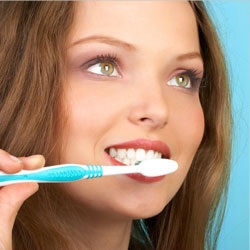What Is Periodontal Disease?
Periodontal disease (gum disease) is an infection of the gums and bone caused by plaque, a sticky film of bacteria that adheres to teeth. Plaque forms constantly on teeth and can build up if it is not removed through daily cleaning.
The bacteria in plaque produce toxins that can irritate your gums. In the early stage, called gingivitis, gums swell, turn red and bleed easily. Eventually, the tissue may separate from the tooth and form deepened spaces called pockets. In this later stage, called periodontitis, the bone and soft tissues that support the teeth can be destroyed, which ultimately can cause the teeth to become loose, fall out, or require removal by a dentist.
Periodontal disease can occur at any age, but it is most common among adults. In fact, three out of four adults are affected by it at some point in their lives. Women are especially susceptible to periodontal disease at certain stages of life. Hormonal changes can affect blood supply to the gums, and response to irritants from plaque may be exaggerated. The gum tissue is a target for female hormones, which makes it much more sensitive to changes in the levels of those hormones. If you are already prone to periodontal disease, you may find the problem worsening during hormonal changes.

The Teen-Age Years
As females reach puberty, the production of the sex hormones progesterone and estrogen increases. This hormonal increase can exaggerate the way oral tissues react to the irritants in plaque. Gums may become red, tender, swollen and likely bleed easily when chewing or brushing teeth. After the early teen years, women may notice less inflammation and bleeding.

Your Monthly Cycle
During menstruation, you may notice several changes in your mouth, including swollen gums, lesions, canker sores and swollen salivary glands. Some women don’t notice any changes at all. For others, particularly those whom plaque or pockets are a problem, the gums may bleed in the days before the period begins. These symptoms may go away once your period starts, but symptoms should not be ignored. Your dentist may prescribe special cleanings, treatment or topical anesthetics to ease any discomfort.
Pregnancy and Your Oral Health
During pregnancy, your body’s hormone levels rise considerably. Gingivitis, especially common during the second to eighth months of pregnancy, may cause red, puffy or tender gums that tend to bleed when you brush. This sensitivity is an exaggerated response to plaque and is caused by an increased level of progesterone in your system. Your dentist may recommend more frequent cleanings during your second trimester or early third trimester to help you avoid problems. Occasionally overgrowths of tissue, called “pregnancy tumors,” appear on the gums during the second trimester. These localized growths or swellings are usually found between the teeth and are believed to be related to excess plaque. They bleed easily and are characterized by a red, raw-looking mulberry-like surface. They are often surgically removed after the baby is born. If you experience pregnancy tumors, see your dentist.
It’s especially important, then, to maintain good oral health during pregnancy. Studies suggest that pregnant women who have periodontal disease may be at increased risk for delivering a pre-term and/or low birthweight baby. If you notice changes in your mouth during pregnancy, see your dentist.
If You are Taking Oral Contraceptives…
One of the most common problems for women who take oral contraceptives, or birth control pills, is inflamed gums. The hormone in oral contraceptives increases the level of progesterone in your system.
Prolonged use of birth control pills may cause your gums to turn red, bleed, and swell in response to any local irritants in the mouth, such as food or plaque. Good oral hygiene is especially important when taking birth control pills. Tell your dentist if you are taking oral contraceptives, because some medications, such as antibiotics, can lessen the effect of an oral contraceptive.
Reaching Menopause
You may notice a number of physical changes when you reach menopause, including some that occur in the mouth. These may include a burning sensation, altered taste sensations (salty, peppery or sour), a decrease in a saliva flow that can result in dry mouth, and greater sensitivity to hot and cold foods or drinks.
Talk with your dentist if you experience any oral problems that you think might be related to menopause. Be sure to mention any medications you are taking (both prescription and over-the-counter products), because many drugs can have dental-related side-effects, including dry mouth. Dry mouth can increase your risk for tooth decay, halitosis (bad breath) and mouth sores. Saliva substitutes may be prescribed to reduce any mouth dryness. Vitamin C and B complexes may be helpful, as well. For good overall health, eat a balanced diet and discuss with your physician hoe to get the calcium you need to prevent osteoporosis (“porous bones”), the risk of which increases after menopause.
Remember that is plaque, not fluctuating hormone levels, that is the major cause of periodontal disease. Here are ways you can help prevent periodontal disease: